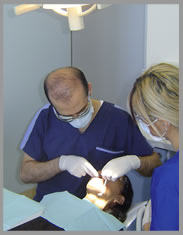Dental Tooth Extraction
 An
extraction is a dental procedure where a tooth is permanently
removed from its socket in the jawbone. In simple terms there
are two types of extractions, routine general extractions
and surgical extractions. An
extraction is a dental procedure where a tooth is permanently
removed from its socket in the jawbone. In simple terms there
are two types of extractions, routine general extractions
and surgical extractions.
Extractions that are classified as routine extractions are
those where the tooth is visible in the mouth and easily grasped
by forceps. These extractions are routinely performed by general
dentists, using local anaesthetic.
A surgical extraction is required for a tooth that has either
not yet broken through the gum or a tooth that has broken
off at the gum line so it is not easily removed. Surgical
extractions are performed by dentists with more advanced skills
in this area.
Some surgical extractions can be performed in the dental
surgery while more complicated surgical extractions may have
to be performed under a general anaesthetic in a day surgery
or hospital. This level of surgery may be carried out by a
suitably trained general dentist, oral surgeon or an oral
and maxillo-facial surgeon (OMFS).
WHY IS IT DONE?
There are a number of reasons why an extraction may be required
and they are:
Tooth fracture, gum disease or decay – our
dentist will attempt to repair the fractured or repaired tooth
but if that is not possible, the tooth may need to be extracted.
Wisdom teeth – Wisdom teeth (third molars)
come through either in your late teens or early twenties,
although sometimes this can occur later in life. In some cases
there is not enough room in the mouth for these molars so
they crowd the molar next to it causing pain and swelling.
Sometimes one or all of the wisdom teeth become impacted which
means they are unable to break through the surface of the
gum which can cause pain, gum infections and sometimes decay
to the wisdom tooth and/or the adjacent molar.
Not only wisdom teeth but other teeth such as canine and
other molars can become impacted as well, causing the same
problems.
An extraction is recommended in these circumstances:
Abscessed (Infected) tooth – This is an
infection of either the root of a tooth or between the gum
and tooth. The most common causes of an abscess are advanced
tooth decay, a severely broken down tooth or a tooth that
has been affected or damaged by a sever traumatic incident.
The infection may be extremely painful. Your dentist will
endeavour to preserve the tooth by treating the infection
but if that is not possible, the tooth may have to be extracted.
Orthodontic treatment – An Orthodontist
may require the removal of permanent or deciduous teeth to
free up space for the teeth that are being moved into place.
Extra teeth – In some cases there are too
many teeth in the mouth due to having extra teeth. These are
called supernumary teeth. In this situation the supernumary
teeth sometimes block other teeth from erupting into the mouth
and may require extraction to free up space.
HOW DO I CHOOSE A SPECIALIST?
Our Dentist, or the doctor you first consulted, will be able
to recommend and refer you to a suitably trained and skilled
dentist or OMFS. Alternatively in some circumstances your
own general dentist may perform the procedure.
You may be happy to accept the advice of your dentist in regards
to choosing an oral surgeon. Or you may like to investigate
your choices; either option is safe and valid. In Australia
each medical speciality has a governing body to which the
consultants belong. For oral and OMFS surgeons this is the
Royal Australasian College of Dental Surgeons (RACDS).
WHAT SHOULD I ASK ?
• Make sure you fully understand the procedure that is planned;
do not be afraid to ask.
• It is your right to know all the relevant information, as
this is part of informed clinical consent. Our dentist/doctor
will ask you to sign a consent form.
• Apart from what the procedure is about you should also
ask about:
• Preparation
• Follow up appointments - jot down any questions or concerns
you may have so that you can ask your doctor at your next
appointment
• Aftercare
• Most medications should be continued as usual, but some
may interfere with the examination. Your dentist/doctor will
inform you of the medications you should stop.
The following are examples of medications that may require
special instructions:
• Aspirin (or any related products) • Blood thinners (Warfarin,
heparin.), • Arthritis medications, • Pain medication, • Insulin,
and iron preparations
WHERE IS IT DONE?
In most cases routine and minor surgical extractions are
done while sitting in a chair at a dental surgery. In some
instances general anaesthetic is required so the surgical
procedure is performed in either a day surgery or hospital.
HOW LONG IS THE PROCEDURE?
The length of the procedure varies as it is dependent upon
the number of teeth being extracted as well as the reason
for extraction. Make sure you ask your dentist or oral surgeon
prior to the procedure being performed.
WHO IS INVOLVED?
If the procedure is carried out as an in-patient in either
a specialised day surgery or in a hospital, the people involved
in the procedure are:
• The Oral Surgeon if multiple or difficult extractions are
required
• Our dentist if a simple extraction is required
• Anaesthetist: they give you medications that make you relaxed
and sleepy and look after you whilst the procedure is being
carried out
• Specialised Nurses for the procedure and recovery
HOW DO I PREPARE FOR A TOOTH EXTRACTION?
In cases of abscess and infection, your dentist
may require you to finish a course of antibiotics prior to
your admission.
You are normally required to fast for at
least 6 hours prior to oral surgery. Our dentist or oral surgeon
will have his/her own specific preparation requirements and
those, along with any instructions given to you by the day
surgery or hospital, should be strictly followed.
WHAT DO I TAKE WITH ME TO THE DAY SURGERY/HOSPITAL?
• Do not bring any valuables with you
• Leave all jewellery at home, except if you wear a wedding
ring
• Bring any medication that you would usually take during
the day, under most circumstances you may still be able to
take these.
|





